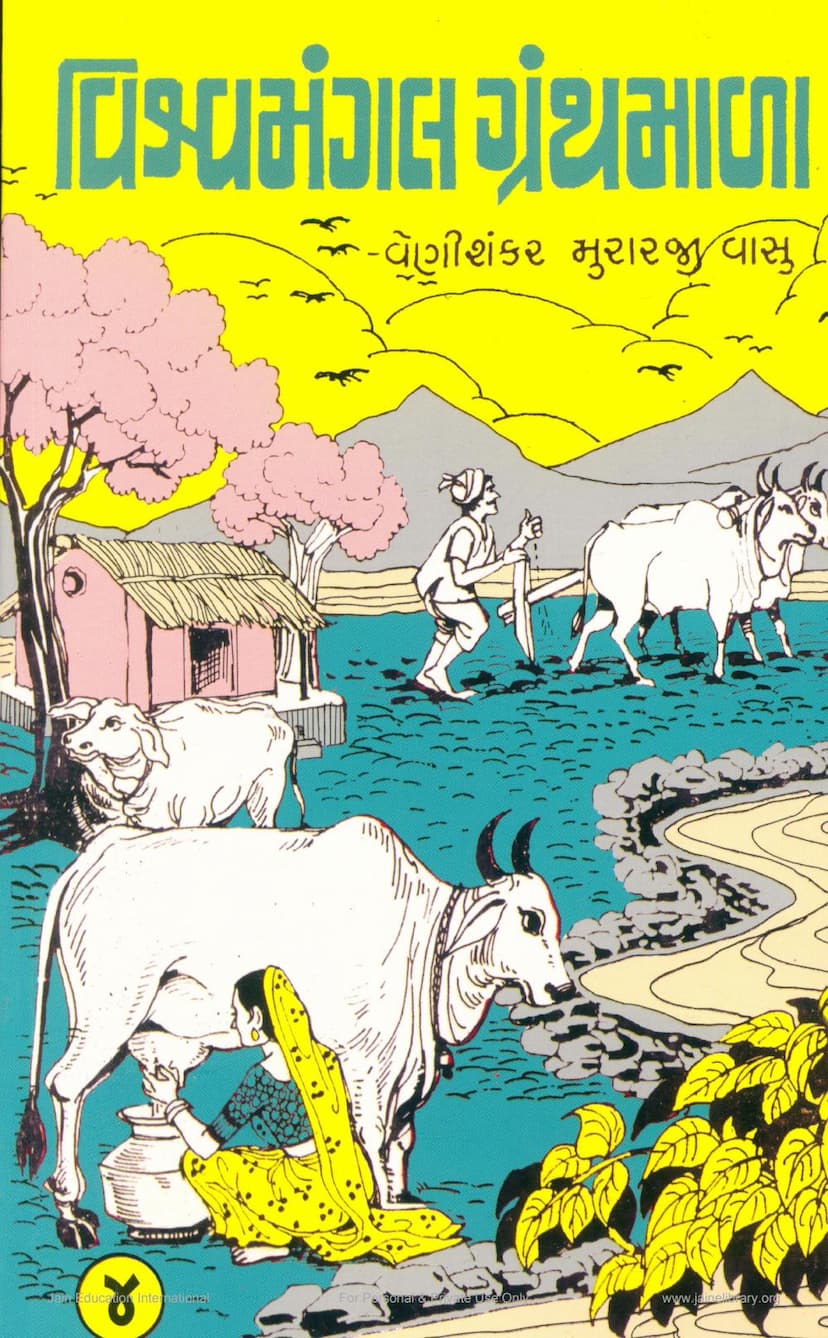Vishvamangal Granthmala Part 04
Added to library: September 2, 2025

Summary
Here's a comprehensive summary of the Jain text "Vishvamangal Granthmala Part 04" by Veishankar Murarji Vasu, based on the provided pages:
Overall Theme:
This book, part of the "Vishvamangal Granthmala" series, is a critical examination of modern Indian society, economy, and culture, particularly from a Jain perspective. The author, Veishankar Murarji Vasu, argues that India has strayed significantly from its ancient, ethical, and prosperity-generating principles, leading to widespread societal problems. The core of the critique revolves around the detrimental impact of Westernization, mechanical industrialization, and policies that undermine traditional Indian values, especially those related to animal welfare, agriculture, and ethical commerce.
Key Arguments and Criticisms:
-
Erosion of Traditional Values: The book laments the decline of India's rich ancient traditions, which were rooted in principles of ahimsa (non-violence), tyagvad (renunciation), ethical economics, and spiritual progress. The author criticizes the adoption of Western, materialistic, and exploitative economic models (capitalism, communism, socialism) that prioritize profit and mechanization over societal well-being and ethical conduct.
-
Critique of Westernization and "Modern" Education:
- The author strongly criticizes the Westernized education system, which he believes produces graduates who are disconnected from their own culture and values. This education, driven by foreign influence and focused on creating cogs for government or industrial machinery, leads to unemployment, corruption, and a disconnect from traditional industries.
- He contrasts the purpose of true education (vidya – that which liberates) with the current system, which he sees as merely imparting knowledge for employment, creating more problems than solutions.
-
Economic Exploitation and the Ruin of Indigenous Industries:
- Agriculture and Animal Husbandry: The book provides a detailed critique of policies that have systematically destroyed India's indigenous agricultural and animal husbandry systems. The author highlights how the focus on mechanization (tractors replacing bullocks), the export of cattle feed, the promotion of Western breeds, and the establishment of modern dairies have led to the decline of native cattle breeds, reduced milk and ghee production, and the commercialization of animals to the point of their destruction.
- Khadi and Village Industries: The author details how British policies and subsequent Indian government policies have undermined and destroyed the Khadi and village industries, which were the backbone of India's economy and societal organization. He argues that instead of promoting these self-sufficient industries, successive governments have favored large-scale, Western-style industries, leading to widespread unemployment and economic dependency.
- Trade and Commerce: The book criticizes how trade has become solely about profit and exploitation, with a focus on accumulating wealth rather than serving societal needs. The author contrasts the past ethical business practices with the present-day corruption and exploitation.
-
The Role of Government and Policy:
- The author is highly critical of government policies, which he describes as "anti-cow," "anti-village industry," and "anti-Hindu." He argues that these policies, influenced by foreign interests, have actively worked to dismantle India's traditional strengths.
- He questions the efficacy of government schemes and subsidies, particularly in agriculture and industry, suggesting they often benefit specific individuals or industries at the expense of the broader population and traditional livelihoods.
- The book criticizes the misplaced focus on building large infrastructure projects like colleges and hospitals while neglecting fundamental needs like clean air, water, and sustainable livelihoods for the masses.
-
The Importance of Jain Principles:
- Throughout the book, the author implicitly and explicitly champions Jain principles of ahimsa (non-violence), aparigraha (non-possession), and tyagvad (renunciation). The critique of industrialization, animal slaughter, and materialistic pursuits is deeply rooted in these values.
- The author stresses the immense value of cattle not just for milk but for their integral role in agriculture, as a source of fertilizer and fuel, and their connection to Indian culture and spirituality. The systematic destruction of cattle wealth is portrayed as a direct attack on India's very foundation.
-
The Need for a Return to Indigenous Practices:
- The book strongly advocates for the revival of India's ancient, self-sufficient, and ethical economic and social systems. This includes promoting Khadi, revitalizing village industries, protecting and nurturing cattle wealth, restoring traditional water management systems (wells, tanks, rivers), and fostering a culture of tyag (renunciation) and community welfare.
- The author believes that only by returning to these indigenous practices can India achieve true prosperity, self-reliance, and spiritual well-being.
-
Social Critique:
- Family Structure and Values: The book touches upon the breakdown of family values and the growing disrespect for elders, attributing it to the Westernized education system and the pursuit of material wealth.
- Corruption and Hypocrisy: The author exposes widespread corruption in various sectors, including education and public service, and highlights the hypocrisy of those who preach ethics while engaging in exploitative practices.
- Social Disparities: The stark contrast between the wealthy elite living in opulent bungalows and the impoverished masses in slums is a recurring theme, emphasizing the failure of current economic policies to address inequality.
Structure and Content:
The book appears to be a collection of essays or articles, as indicated by the chapter-like sections with titles like "Is This Foreign Slavery Yet?", "Lootism vs. Renunciation," "Khadi," "What Now?", and several titled "Samajdarshan" (Social Observation). The author uses examples and anecdotal evidence to support his arguments, often drawing parallels between historical events and contemporary issues. He frequently cites statistics and government reports to underscore the severity of the problems.
In Essence:
"Vishvamangal Granthmala Part 04" is a passionate and comprehensive indictment of India's post-independence development trajectory. Veishankar Murarji Vasu calls for a radical shift back to the principles of Jainism and ancient Indian wisdom, believing that only by rejecting Western materialistic models and embracing self-sufficiency, ethical economics, and reverence for life can India truly achieve Vishvamangal (universal welfare and prosperity). The book serves as a wake-up call, urging readers to recognize the self-destructive path India has taken and to actively work towards restoring its spiritual and economic foundation.